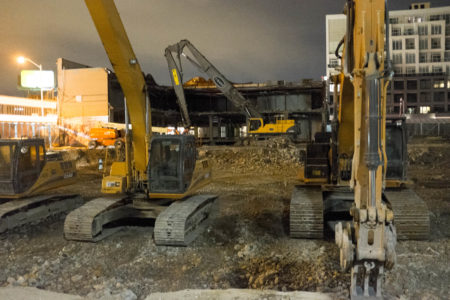Author: Milan
B.C.’s latest move against the Kinder Morgan pipeline
When it comes to stopping unsustainable fossil fuel development, anything that creates investor uncertainty can be useful. By that metric, the British Columbia government’s announcement of a diluted bitumen shipment expansion moratorium while it studies how a diluted bitumen spill would unfold is a small contribution to shifting Canada to an acceptable development pathway.
Still, I wish governments would look squarely at the real problem: the fundamental contradiction between continued fossil fuel exploitation and the climatic stability objectives that states including Canada asserted in the United Nations Framework Convention on Climate Change, the Paris Agreement, and in their own climate announcements. Making it all about local issues may be politics as usual, but it misses the main ethical issues at play.
Downstairs corridor at Massey College
Noah’s ark drawing in the Gerstein Science Library
PhD update — January 2018
I have created a draft update to my research ethics proposal, based on the comments from the U of T research ethics board. I’ve circulated it to my supervisory committee and am waiting for any comments from them before checking it over again and sending it back to the board.
I have two sets of tutorials this week: Canadian politics tutorials today about NAFTA and U.S. politics tutorials Wednesday and Thursday on the presidency.
The week is peppered with student meetings, with some people asking about/seeking better grades on last term’s exams and papers, and some seeking advice on ongoing essays.
The most time-consuming thing is commenting on and grading a large batch of essay rough drafts. For those submitted on time (about half of what I have received so far), they are meant to be handed back in the U.S. tutorials. Pushing through the set will be my main alternative to thesis work / recreation / relaxation for the next 4-5 days at least.
Holding two TA positions at once has certainly been helpful from a financial perspective. It has been allowing me to slowly rebuild my PhD fund after the expenses of another unfunded summer. It has been a major impediment, however, to making progress on my thesis. Thesis research is a demanding cognitive task not easily undertaken in the gaps between other obligations or when exhausted from hours of commenting on disorganized papers that have never been proofread.
This summer, instead of trying to keep my finances on a level, the plan is to make a concerted effort to undertake the data collection, analysis, and reading which will feed into the completion of my doctoral thesis.
Dundas St. mural
The Fourier transform
Richard Dawkins’ Unweaving the Rainbow includes a great discussion of the scientific uses of the Fourier transform. Most amusingly: “The side-to-side waving of the urine trail on the road was presumably produced by the long [elephant] penis acting as a pendulum (it would be a sine wave if the penis were a perfect, Newtonian pendulum, which it is not) interacting with the more complicated periodicity of the lumbering four-legged gait of the whole animal.” (p. 73)
This video provides an accessible visual explanation of how this mathematical tool breaks down a complicated curve into its constituent sine waves, and some of the useful applications for that transformation:
Diggers
“Just one more” is the binding factor in the cycle of suffering.
Arbitrary power and moral corrosion
It seems to be a feature of human psychology that arbitrary power over others corrodes virtue. That claim can be supported by highly artificial (and unscientific) situations like the Stanford prison experiment, but it’s also evident in day-to-day interactions. We may hope that an innate sense of fairness would be enough to usually stop people from pressing an undeserved advantage; failing that, people might be counted on to recognize that we tend to interact with the same people over and over, and reputation is important, so it’s in our interest not to exploit a unilateral advantage. And yet, when actually put in the situation where we can dictate terms to others, too often we use the power for selfish ends while pulling together a rationalizing story for ourselves about how what we’re doing is savvy, or fair, or even benevolent.
Perhaps the most extreme case of arbitrary power concerns decisions made today that affect future generations. I think Henry Shue’s moral analysis of climate change is among the most perceptive accounts of the problem:
The ones who need to worry about severe climate change are the most vulnerable, including children yet to be born, who may reap the whirlwind if we sow the wind. Those who will suffer most, if anyone does, will be people with absolutely no past role in causing the problem and with no other kind of responsibility for it (and other species, most with no capacity for morally responsible action but full capacity for suffering and frustration). This would put the wrong done by the avoidable precipitation of severe climate change, it seems to me, in the general moral category of the infliction of damage or the risk of damage on the innocent and the defenseless. This is far worse than simply neglecting to protect rights, as wrong as that is, and it more like recklessly dropping bombs without knowing or caring whom they might hit. Can someone seriously argue that we are not morally responsibilty for avoiding the wreaking of such havoc?
Shue, Henry. “Deadly Delays, Saving Opportunities” in Gardiner, Stephen et al eds. Climate Ethics: Essential Readings. Oxford; Oxford University Press. 2010.
What remedies exist for these dangers of arbitrary power? They fall into three categories.
At the individual level, first we can work to guard against the risk of behaving in this way when we’re the ones with the power. Trying to apply a Kantian notion of acting in the way we would like everybody to act may provide some protective restraint. We can make sure to have open communication with the people affected by our choices, and work to maintain a willingness to hear what they tell us. Especially when it comes to person-to-person interactions, we should avoid the perspective that it’s virtuous and a sign of intelligence and capability to take as much as possible and leave the others involved with only the scraps they were able to hold onto. We should avoid perspectives on ethics based around entitlement – the view that because things have been one way in the past, we have a right for them to continue that way forever. It’s a form of reasoning that entrenches injustice, and which perpetuates ever-worsening outcomes when we assert the right to the over-generous fish and water allowances of the past while turning the land and sea to desert. The ethics of a situation must be evaluated with changing circumstances borne in mind, and with no automatic value attributed to arrangements which are long-standing.
As individuals we can also use social pressure to discourage and punish selfish behaviour. We can make public records of cases where people have abused their power over others and use those records to punish the abusers in cases where they have become subject to the power of someone else. The internet could be a big help with this, since sharing the information is easy, and it is easy for others to find. It’s not much help against the most dishonest — con artists who create a new identity in each town they visit — but it could provide some protection against abuse by those who operate under their own name and generally seek to preserve their good reputation. This is one reason we should be skeptical when people assert a “right to be forgotten” that applies to true information they would prefer others not to know about.
At a societal level we can and do enact policies that limit arbitrary power and provide recourse and remedies. This is especially important when circumstances make people vulnerable to abuse: whether they are seeking housing in an over-heated market, employed in a dangerous trade, or otherwise at risk. This is a big reason why criminal prohibition of things like sex work and psychoactive drugs actively causes harm: it puts vulnerable people in a situation where they cannot complain or seek help from the authorities. We need to be mindful of situations where regulation creates in-between spaces where the rules don’t apply, such as by leaving precarious workers without the legal right to employment under the power of abusive employers.
Perhaps in the long term human beings are capable of moral growth. More immediately, we can design and operate institutions which work with people’s imperfections and which mitigate the harmful impacts they create on others. We can also demand more of the people who we know. In a world that has grown crowded with existential dangers we have created for ourselves, acting with generosity toward others has grown beyond a virtuous extra to be applauded. It has become bound up with the potential for human survival and flourishing. Those espousing a moral philosophy where what you deserve is determined by the power you hold and the ruthlessness with which you wield it should gradually find themselves without power, and without the respect of the community.





